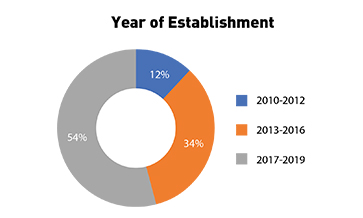Early March this year saw things slowing down, and by mid-March everything came to a standstill. What worried us was not knowing how long this situation would last and not being able to plan ahead.
However, during lockdown, we consolidated our business and relocated the smaller restaurant (Black Sheep Bistro) into the larger space (Black Market) with the idea that it would help us with proper social distancing when things re-opened. This worked very well because we are able to seat our guests with adequate physical distancing now.
We didn’t downsize our staff during the lockdown and ensured that everyone had a roof over their heads, food and basic income (whatever best we could offer at the time).
After the lockdown was lifted most of our staff was still with us; so staffing wasn’t affected too badly. However, a few team members left for their villages and may return in the future.
In the ‘new normal’ we ensure proper social distancing by keeping at least one empty table between any two tables and 50% occupancy at any given time; we record temperatures and phone numbers at the door for contact tracing of everyone entering our premises.
We all wear masks on duty, ensure proper hygiene with frequent sanitisation of the premises, follow exacting housekeeping standards and follow all norms for post-lockdown operations.
Cash flow
We have always focused on sourcing locally, so our supply chain hasn’t been affected. But some products that came from outside Goa, such as mutton, we have removed from the menu for the time being.
Fortunately, our procurement costs haven’t changed; but we have reduced our inventory to only fast-moving items and cut down on unnecessary expenses with regard to food and liquor.
In order to protect cash flows and maintain a healthy financial outlook, we negotiated with all suppliers and reduced our inventory. We consolidated our loans and closed a few early, to save our monthly outgo.
We have also invested in digital technology and added delivery model within our business, which helped bring in revenue during lockdown, before dine-in was permitted.
Like I said before, we also relocated the smaller outlet into the larger one to save on rentals and overheads of two restaurants. Because of all these steps we have already managed to break even!
Helping hands
Of course, we had a lot of support from the local community – all our regular guests, our stakeholders and suppliers displayed their trust in us and extended their support.
We won a prize of Rs 50,000 from the makers of Svami tonic for a contest they organised to support restaurants across India. We also received a gift voucher of Rs 5,000 from Greater Than gin for another contest.
Beer suppliers, such as Susegado Brewery and Goa Brewing, took back all of their old stock and refreshed them after the lockdown at no cost to us! All aerated beverages were also replaced in a similar manner.
Other than this, almost all of liquor suppliers extended their credit period and didn’t pressure us to pay any bills. I am happy to say that today all our bills are paid up!
I think we should all look at this pandemic as an opportunity. We did exactly that and are seeing the advantages of cutting down all those extra costs. We have incorporated our learning in our business strategy now.
Lessons learnt
I would say one has to be honest with and open to all your stakeholders, including your staff, about the situation. Reduce your inventory and do not spend on anything unnecessary.
It is also important to stick to local sourcing wherever possible.
Plan for up to 24 months in advance, and include contingency plans. Many people wait for months together, by which time they have lost tens of lakhs of rupees in their businesses.
Never panic when things look really bad – situations have a way of improving over time. Look at disruptions as opportunities to find ways to meet challenges; you may discover a new way of doing things in the process!
Conduct yourself and your business with highest ethical standards. When people around you trust you, they will be there for you in good times and bad. Last, but not least, try and help the less fortunate whenever you can.














